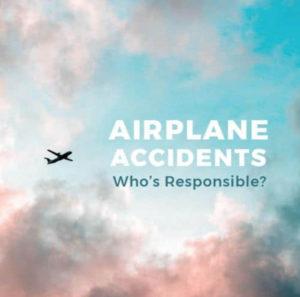
Plane crashes and other aviation accidents are usually big news in the media. Many people worry about dying in a crash. According to ABC News, however, the National Transportation Safety Board (NTSB) reports the survivability rate of aviation incidents is 95.7 percent.
However, injuries can be serious and traumatic when they occur. Blunt force trauma, broken bones, brain injuries, and internal bleeding are among the injuries victims could endure. If you or your loved one gets hurt in one of these crashes, you will need to understand how unique they are from a legal perspective.
What Causes Airplane Accidents?
According to Boeing, human error causes about 80 percent of airplane accidents. Almost 20 percent happen because of equipment failures, defective parts, or maintenance concerns. Sometimes, a combination of several factors is the cause.
In addition to pilot error and equipment issues, other causes of aircraft accidents include:
- Improper plane maintenance
- Fuel problems
- Weather
- Emergency landings
- Other federal regulations violations
Determining the crash’s cause will play a crucial role in identifying the liable party and holding them responsible. It is important to remember that an airline is responsible for getting passengers to their destination safely. A personal injury law firm that handles these cases can help you understand more about airlines and your rights.
For a free legal consultation, call 800-537-8185
Can You Sue If Your Plane Crashes?
While the legalities of airplane accidents are more complex than other transportation accidents, it is possible to hold the liable parties responsible. Filing legal action may be an option for injured passengers or their surviving family members if the crash was fatal.
When an aviation accident occurs, they generally fall under the jurisdiction of the NTSB. The NTSB will begin to investigate the crash’s cause. This usually begins within hours after the crash. The board is a separate entity from other federal agencies to ensure an independent investigation takes place.
Because the Federal Aviation Administration (FAA) also sets standards for aviation operations, it will also investigate after an accident. Depending on the circumstances, other parties may also aid these federal teams or run their own investigation. This could include:
- The Federal Bureau of Investigation (FBI)
- The airline
- Involved insurance companies
- Law firms representing victims and their families
- Foreign governments whose citizens were injured
Aviation lawsuits usually take the form of negligence or product liability claims. When using the negligence theory, an airline is considered a common carrier under federal law. It will transport anyone who buys a ticket, so the airline is expected to take reasonable actions to keep passengers safe. Plane owners and operators can also be liable for negligence that causes an accident.
In contrast, under the product liability approach, the manufacturer of the plane or a specific part can be liable for a defective design or poor manufacturing. This means several entities are often accountable, sometimes for a combination of negligence and product liability.
How do I Sue an Airline?
If you were hurt in an aviation accident, a lawsuit may be necessary. This is a complex process that could include:
- Jurisdiction (where a lawsuit can be filed)
- Applicable timelines and deadlines
- Recoverable damages and damage caps
- Liability
Having an experienced aviation accident lawyer by your side throughout this process is crucial to a favorable outcome. They can often identify the most advantageous jurisdiction, identify the necessary procedural rules, and manage the claims process or a lawsuit on crash victims’ behalf.
International Versus U.S. Aviation Accidents
It is important to understand that accidents in the United States are handled differently from international ones. In an international aviation accident, treaties or other international laws may govern victims’ rights and what monetary damages they can recover.
When a plane crash occurs in the United States, the Aviation Disaster Family Assistance Act governs and requires several actions to help victims. These include the following:
- The NTSB must designate a nonprofit to coordinate services for victims, such as transportation and mental health support.
- Airlines must notify families before making victims’ names public.
- Airlines also must set up a toll-free number for families to receive updates.
- Airlines must help families with travel, room and board, and transportation to and from the crash site.
Click to contact our personal injury lawyers today
Do I Need to Hire an Attorney to Help With an Airplane Accident?
If you or a loved one sustained injuries in an airplane accident, you can speak with one of our attorneys for free. We work on a contingency fee basis, charging nothing up front for a case evaluation.
You may be able to file a claim for medical costs, lost income, emotional distress, and non-economic damages, such as pain and suffering if:
- You suffered financial, physical, and/or emotional harm because of a plane crash.
- Your loved one was hurt and died in an aviation accident.
- You are the personal representative of someone who died from their accident injuries.
Because of the unique factors of these accidents, you do not want to navigate this process on your own. Most end in out-of-court settlements, but that does not mean you do not want a legal advocate on your side. An attorney can fight for justice while you heal from your injuries.
Have You Suffered an Injury or Loss in an Aviation Accident?
An aviation accident attorney from the Morris Bart law firm will evaluate your case’s facts and determine your legal options today. Initial consultations are free. We have 15 office locations throughout Louisiana, Mississippi, Alabama, and Arkansas.
Call (800) 537-8185 now to discuss your case with an attorney from our firm for free.
Questions?Call 800-537-8185
to find a Morris Bart office near you.





